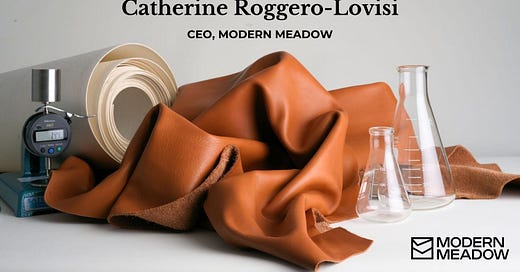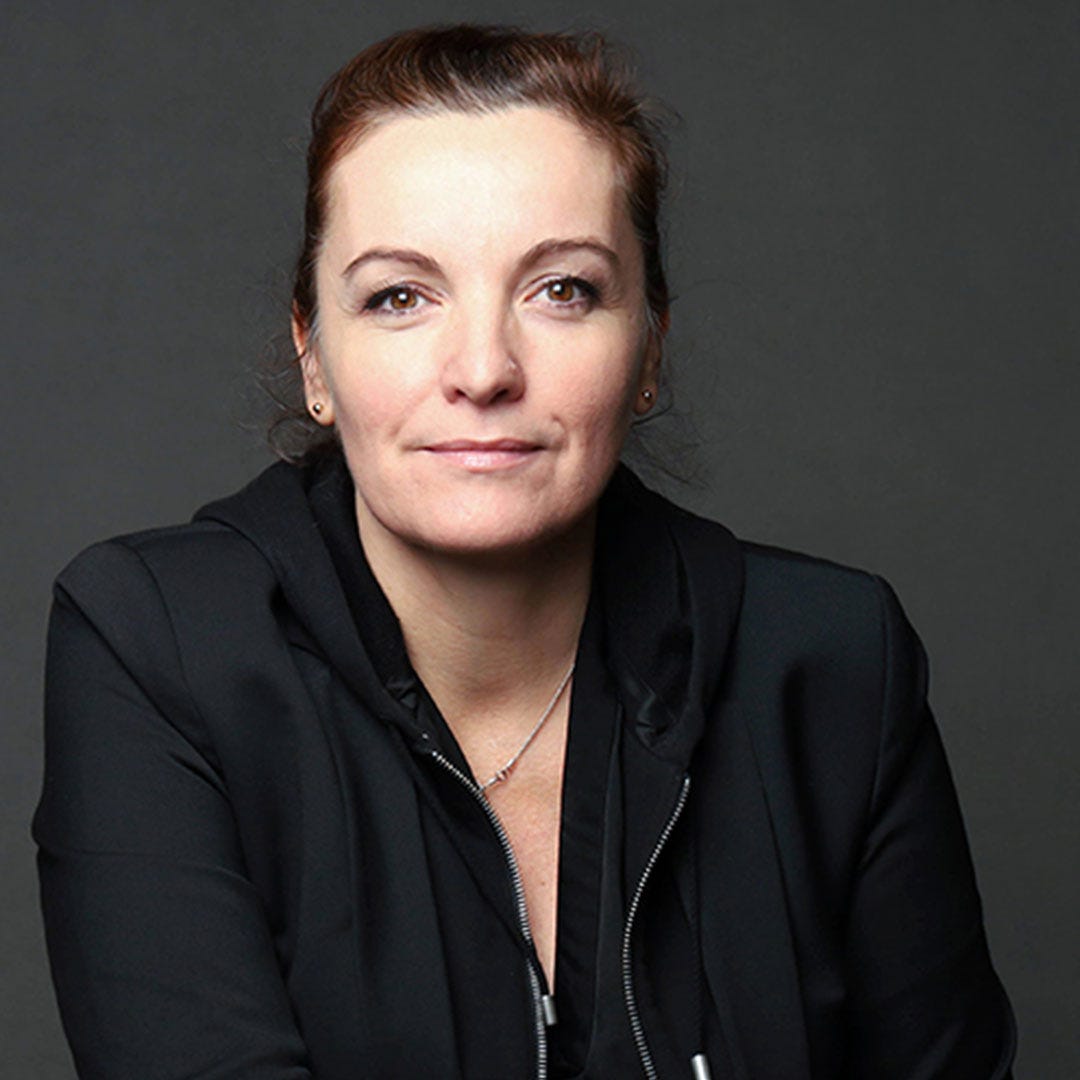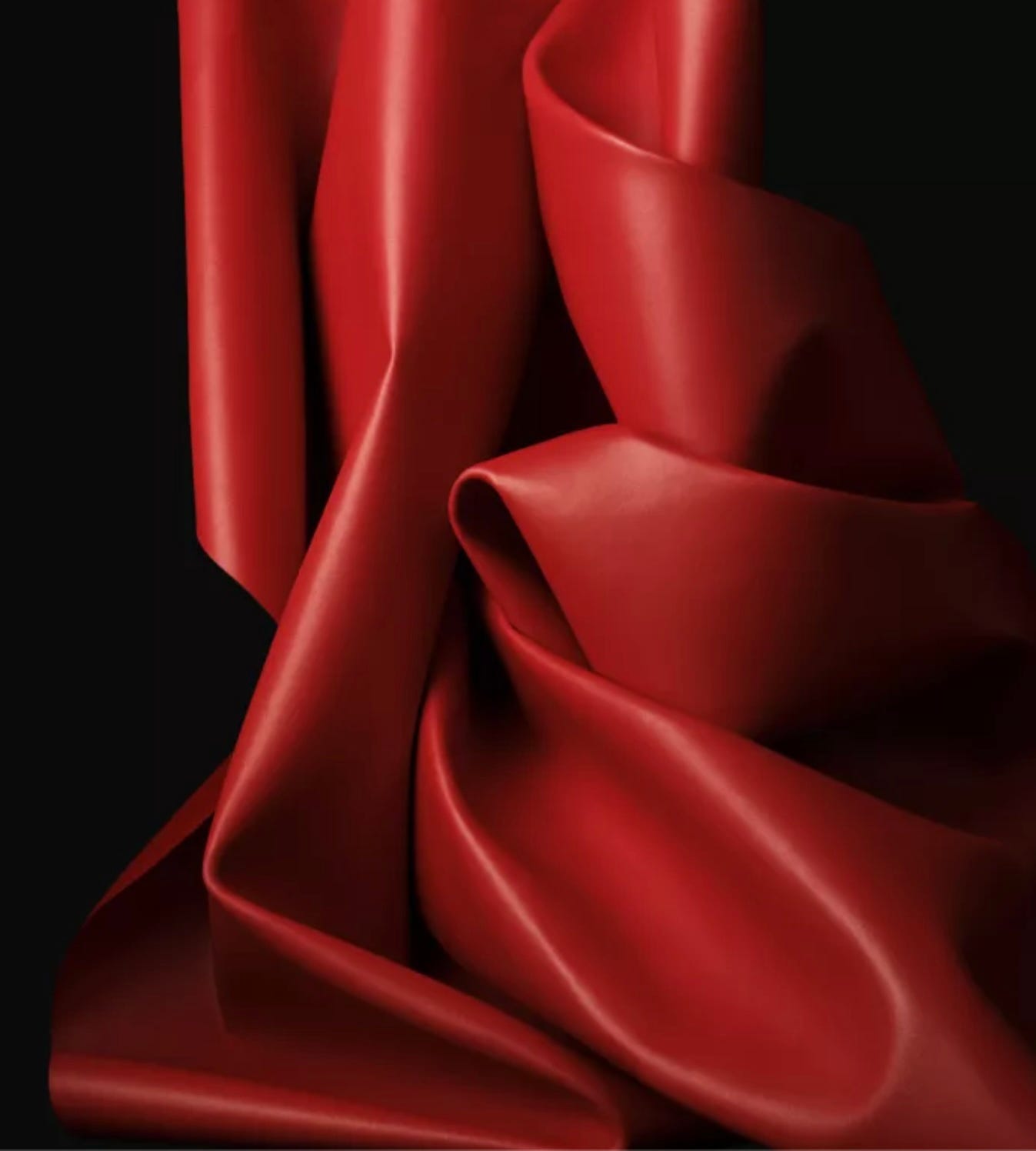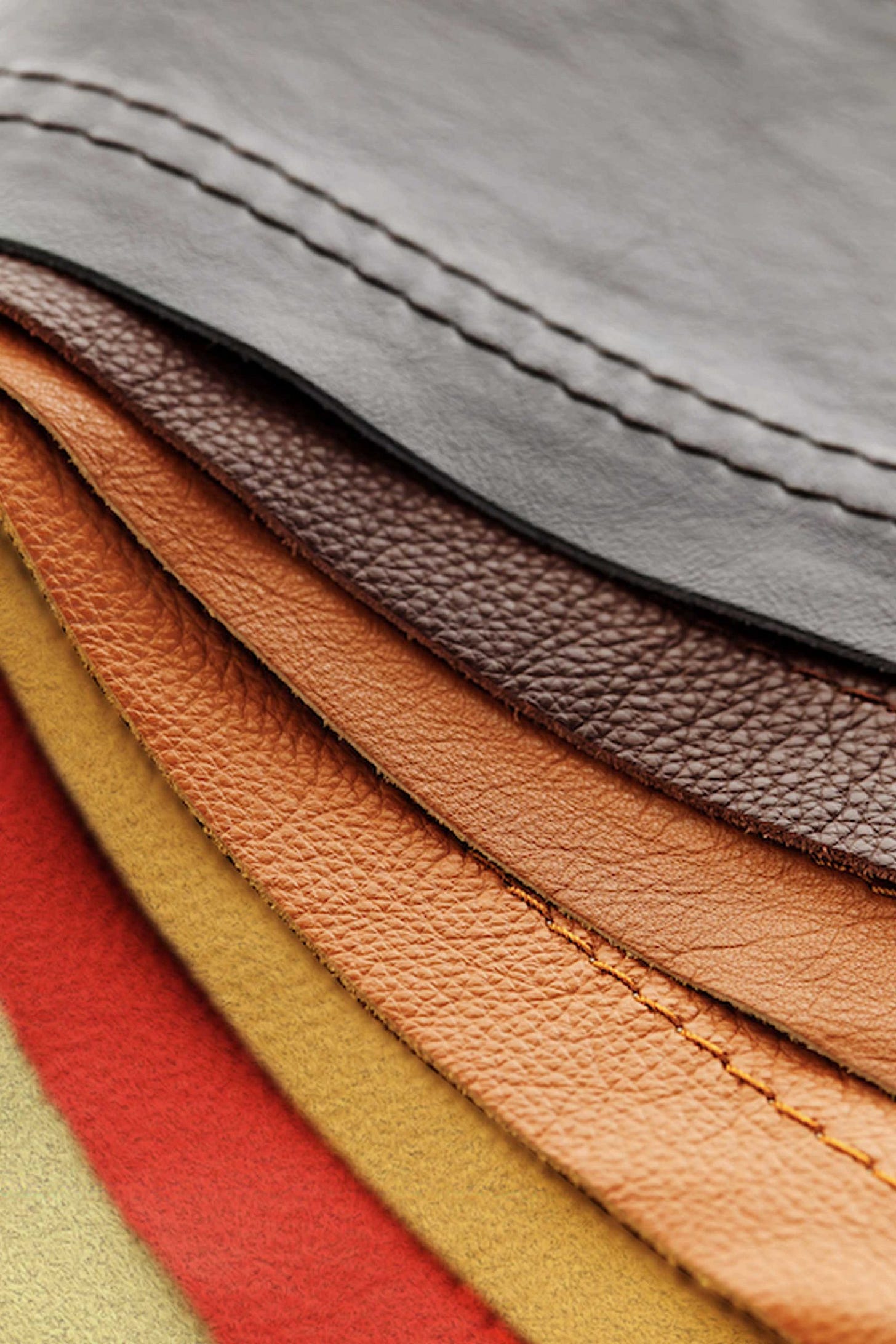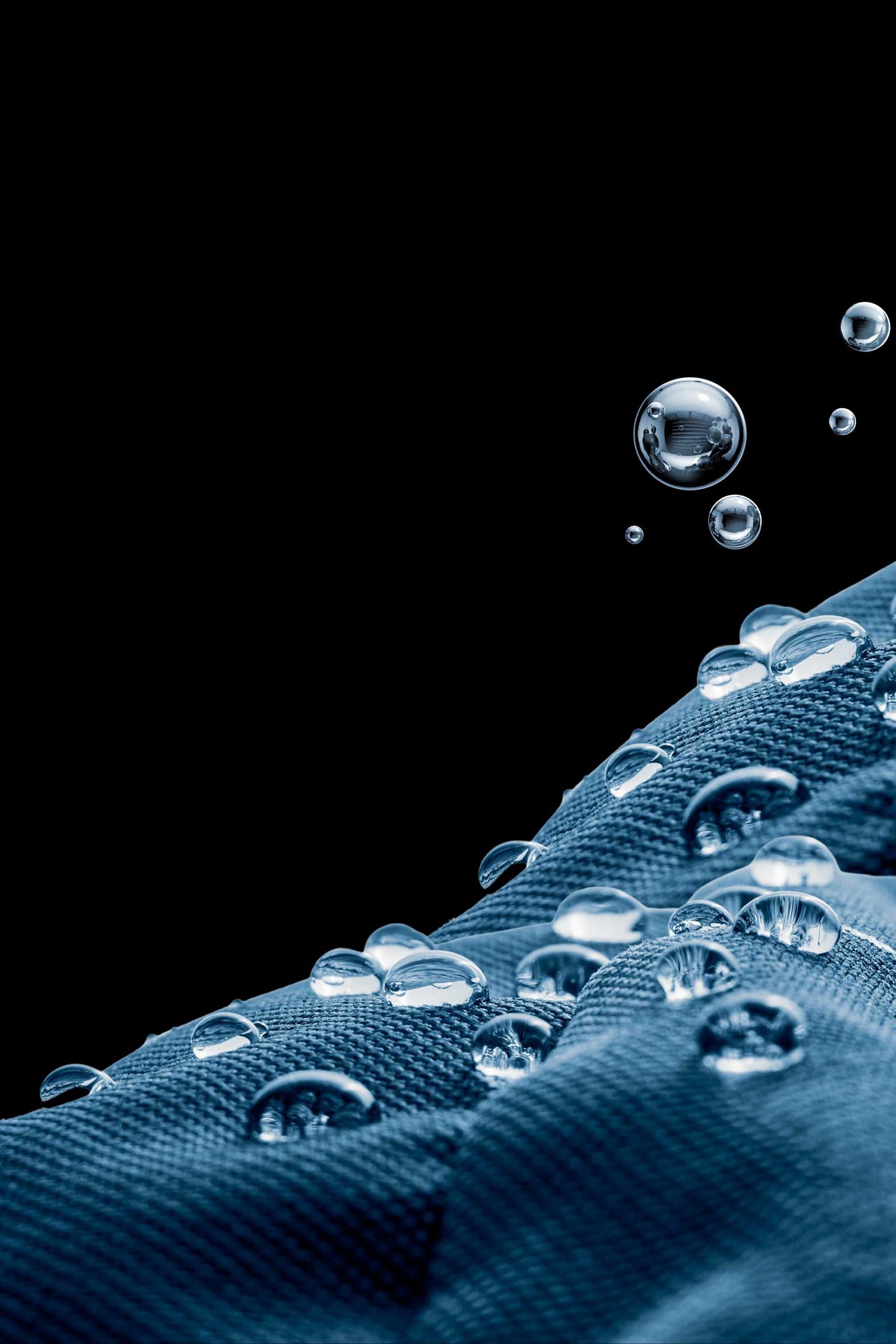Lab-Grown Luxury: Can Bio-Science Save Fashion?
A Conversation with Catherine Roggero-Lovisi, CEO of Modern Meadow
As a textile upcycling artist, circularity of material has been top of mind for me for a long time. End of life treatment and landfill diversion are low-hanging-fruit topics that are commonly relevant to my work ethos. However, there’s only so much knowledge an individual can gather, digest, and implement.
Beyond my own practice, there’s an evolving state of perpetual curiosity about how textile innovations. What is the state of textile innovation right now? Are they better for the environment and us? How scalable are they? What are the nuances of engineered textiles and their current challenges? How do they introduce these materials to mass market?
I had the privilege to have many of these questions answered by Catherine Roggero-Lovisi. She is a global consumer goods industry veteran with a track record of leading entrepreneurial and large-scale global businesses such as L’Oréal, Revlon Inc., and Christian Louboutin.
Now she is the CEO of Modern Meadow, a a sustainable bio-design technology company that uses nature-inspired proteins to develop solutions that reduce our reliance on petrochemical and animal-derived inputs. If you are a Tory Burch fan, you might have seen their collaboration with Modern Meadow since Spring 2023.
I’m really excited to present this Q&A with Catherine Roggero-Lovisi and Modern Meadow. It’s a dream come true to debut Fafafoom Studio Newsletter’s “Industry Insights” segment.
I hope you will find it illuminating, and please consider becoming a paid subscriber to help me make “Industry Insights” a permanent periodical segment!
*Special thanks to Arden Izzo of Farrow Communication for facilitating this interview. All photos are courtesy of Farrow Communications.
Textile innovation via biotech is the future of fashion. Development of alternative leathers from mushrooms, pineapples, orange peels, and so on have been under works for many years, and started to rise in the media for the last decade or so.
In Modern Meadow’s case, the company is engineering leather out of plant-based protein creating a biomaterial that feels like leather yet is 100% animal free. Would you talk a little bit about the state of Modern Meadow’s leather development right now and where it’s going in the next 3 years?
Absolutely! We are harnessing the unique properties of plant matter - specifically, proteins - to drive a sustainable shift away from both virgin petrochemicals and animal-derived inputs without compromising on benefit and performance.
Modern Meadow's leather alternatives are enabled by Bio-Alloy™, our groundbreaking fusion of plant-based protein and bio-polymer. This blend revolutionizes performance and sustainability at the molecular level, setting a new standard for eco-friendly innovation.
We have a few leather alternatives in the works. One such material is Bio-Tex™, a high-performance, leather-inspired material system that offers limitless possibilities in look, feel, and color.
We’ve launched this biomaterial with several brands, including a collaboration with Tory Burch since Spring 2023. This partnership marked a historic milestone, propelling biomaterials into the spotlight by showcasing Modern Meadow's innovative materials in a collection that harmonized elegance with sustainability.
Another leather alternative product in development is called Bio-Vera™. Unlike Bio-Tex™ which is a ‘leather-inspired’ material, Bio-Vera™ is a true leather replacement. It is a next-gen, animal-free material that not only mimics the visual, textural, and aging qualities of leather and suede but also outshines them! Functioning as a state-of-the-art, protein-infused canvas, Bio-Vera™ empowers leather partners to infuse their time-honored craftsmanship into the creation of exquisite, tailor-made materials, across multiple industries.
Bio-Vera™ is set for commercialization in 2024, and we've already established partnerships with BASF and TFL, with more collaborations on the horizon. Our primary target markets initially encompass the footwear, automotive, and fashion industries.
Beyond our focus on leather alternatives, Modern Meadow is actively developing various sustainable innovations. For instance, Bio-Tex Shield™—although not a leather alternative—is designed for waterproof, breathable textiles, showcasing the versatility of our Bio-Alloy™ technology.
When we talk about any biomaterial innovations, there is always a concern about scalability. Have Modern Meadow figured out how to get large buy-ins from brand partners and get your biomaterials available for the mass market?
At Modern Meadow, we deeply understand the challenge of scalability, a hurdle often faced by innovators. Our approach involves developing technologies that are designed for scalability, performance, and sustainability right from inception, recognizing their collective role in driving tangible real-world impact.
This strategy is manifested through our technology designs that seamlessly integrate into existing manufacturing infrastructure, encompassing equipment and processes, requiring minimal capital investment. For instance, Bio-Tex™ adopts a conventional textile coating process, while Bio-Vera™ utilizes established post-tanning and finishing procedures akin to traditional leather production.
Additionally, we collaborate with top-tier partners renowned for their expertise in manufacturing, capable of rapidly scaling operations. Partners such as Limonta, Singtex, among others, boast extensive relationships with leading brands, positioning them ideally to fulfill a diverse array of brand requirements.
To this day, we have an ever-growing, global issue of overproduction of petroleum-based fabrics. Patrick Grant from Great British Sewing Bee famously said, “We have enough clothing on the planet right now to clothe the next 6 generations of the human race: we have to find ways of using what we’ve got.”
Can you give some examples of how Modern Meadow can perhaps influence drastic reduction in overproduction of non-biodegradable synthetic fabrics?
Absolutely! Our primary goal at Modern Meadow is to diminish the world's reliance on virgin petrochemical and animal-based inputs by substituting them with bio-based alternatives, which in turn significantly reduces the environmental footprint.
The problem of overproduction intertwines with the issue of inadequate durability and shortened product lifespan. In the era of fast fashion, items are often designed for short-term use and rapid replacement rather than enduring quality.
At Modern Meadow, our technology designs prioritize both performance and durability, aiming for longer-lasting products. For instance, our leather alternative, Bio-Vera™, boasts a strength twice that of traditional leather, ensuring increased durability and an extended lifespan.
Keep reading with a 7-day free trial
Subscribe to Fafafoom Studio Newsletter to keep reading this post and get 7 days of free access to the full post archives.


